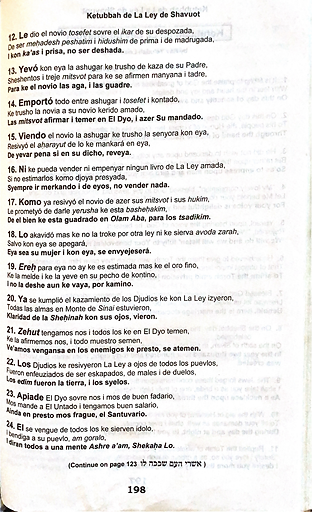In most Jewish communities throughout history, the dominant language of prayer has been Hebrew, the “holy tongue.” Yet, since antiquity, there has been a rich parallel tradition of prayer in the “mother tongue,” the primary language spoken in a region or country, or a recent ancestral mother tongue. This has been most common in Ladino/Judeo-Spanish, but there have been examples in several other languages.

Reuben Eliyahu Israel's Ladino Selihot
Stroum Center, University of Washington
Asher Shasho Levy's concert/lecture on Judeo-Arabic Shabbat liturgy
Part 3 of a 4-part series, "Jewish Prayer in Many Languages"
Judeo-Aramaic / Jewish Neo-Aramaic

Greek / Judeo-Greek
Judeo-Provencal
Seder tefilot be-targum le-Shuʾadit. Prayerbook in Judeo-Provencal, 14-15th century, University of Leeds Library
Judeo-Arabic
Habib Allah Eliyahu and Eliyahu Bil Karmel, Aleppo tradition



Habib Allah Eliyahu from Sha'ar Benyamin,
the Damascene community in Mexico

Habib Allah Eliyahu, Iraqi version, credited to
R'Yosef Hayyim (Ben Ish Hai)


Habib Allah Eliyahu, Gabriel Shrem
Judeo-Persian
Judeo-Persian from the Mashhadi community in New York, about the Sacrifice of Isaac
Psalm 23 with Persian translation in the second half
Ashreikhem Yisrael (English Translation)
By the merit of the Torah of Moshe
By the merit of this assembly of friends
Deliver to us good news
About the coming of salvation
Happy will be, happy will be, happy will be Israel
From the fountains of salvation
We bring out the waters of life
Deliver to us good news
About the coming of salvation
Happy will be, happy will be, happy will be Israel
Ashreikhem Yisrael in Judeo-Persian, performed by Leslie Goldberg at HUC New York (English translation to the right, Judeo-Persian lyrics and audio here.)
Visit the High Holiday Liturgy page for more examples of Judeo-Persian
Judeo-Portuguese
London Portuguese Mi Shebarakh for those arrested by the Inquisition

London Portuguese Mi Shebarakh for those traveling by land or sea

London Portuguese Mi Shebarakh for Shabbat Mitsvot

Ladino/Judeo-Spanish
Bendicho su nombre or La bendición a Israel (Berih Sheme), a Trezoro de Kantes (Ladino Song Treasure)


Berikh Sheme in Ladino, Behar edition

Elav Mi Hiqsha in Hebrew

Berikh Sheme, Salonika version, 1979
Elav Mi Hiqsha in Ladino

En k'Elohenu in Ladino, a Trezoro de Kantes, Los Angeles edition

En Kelohenu, Hazzan Isaac Azose, Seattle

En Kelohenu, Moroccan Haketia Version
En k'Elohenu in Ladino alongside Hebrew script, Seattle edition

Ketubbah de La Ley (reading / marriage contract of the law) de Shavuot in Ladino, Seattle


Lekha Dodi in Ladino

Ya Ribon in Ladino

Ya Ribon/Ya Sinyor, Ankara version
Ketuba le Matan Torah, Gabriel Shrem
Hazzan Isaac Behar, son of Rabbi Leon Yehuda Behar who wrote the Lekha Dodi translation in Ladino.

Yigdal in Ladino

Ya Ribon/Ya Sinyor, Istanbul version
Hamavdil with Judeo-Spanish stanza, Ottoman tradition

Hamabdil, Yehoram Gaon, Ensemble Hiba (Judeo-Spanish verse begins at 1:50)
Book of Ruth Chanted in Ladino

Bible in Ladino, Ferrara 1553, Seattle Ladino Community

Book in Ladino, Ferrara 1552, Seattle Ladino Community

Song of Songs in Ladino, Salonika 1876, Seattle Ladino Community

Paraphrasis, Amsterdam 1664, Seattle Ladino Community

Constantinople 1744

Siddur for Women in Ladino, Seattle Ladino Community


Women's Siddur, Salonika 1565, Seattle Ladino Community

Siddur for the Four Fasts in Ladino, Seattle Ladino Community
En Kelohenu Hebrew/Ladino Liturgical Songs, The Spanish and Portuguese Synagogue of Montreal
Liturgical Songs and Chants according to the Turkish Balkan Sephardic Tradition, from Song of the Sephardi

Pirkei Avot, Ethics of the Fathers
Seattle Ladino Community

Pirkei Avot, Venice, Italy - Seattle Ladino Community

Pirkei Avot, Saloniki, Greece, 1893 - Seattle Ladino Community

Pirkei Avot, Florence - Seattle Ladino Community

Pirkei Avot, Jerusalem 1901 - Seattle Ladino Community

Pirkei Avot in Ladino, translated by Ora Rodrigue Schwarzwald, 2018
Pirkei Avot chanted in Ladino, featured in "The Sephardic Ladino Tradition"
Birkat Hamazon chanted in Ladino, featured in "The Sephardic Ladino Tradition"

Shirat HaYam, Song of the Sea, in Moroccan Ladino, by Yigal Biton









